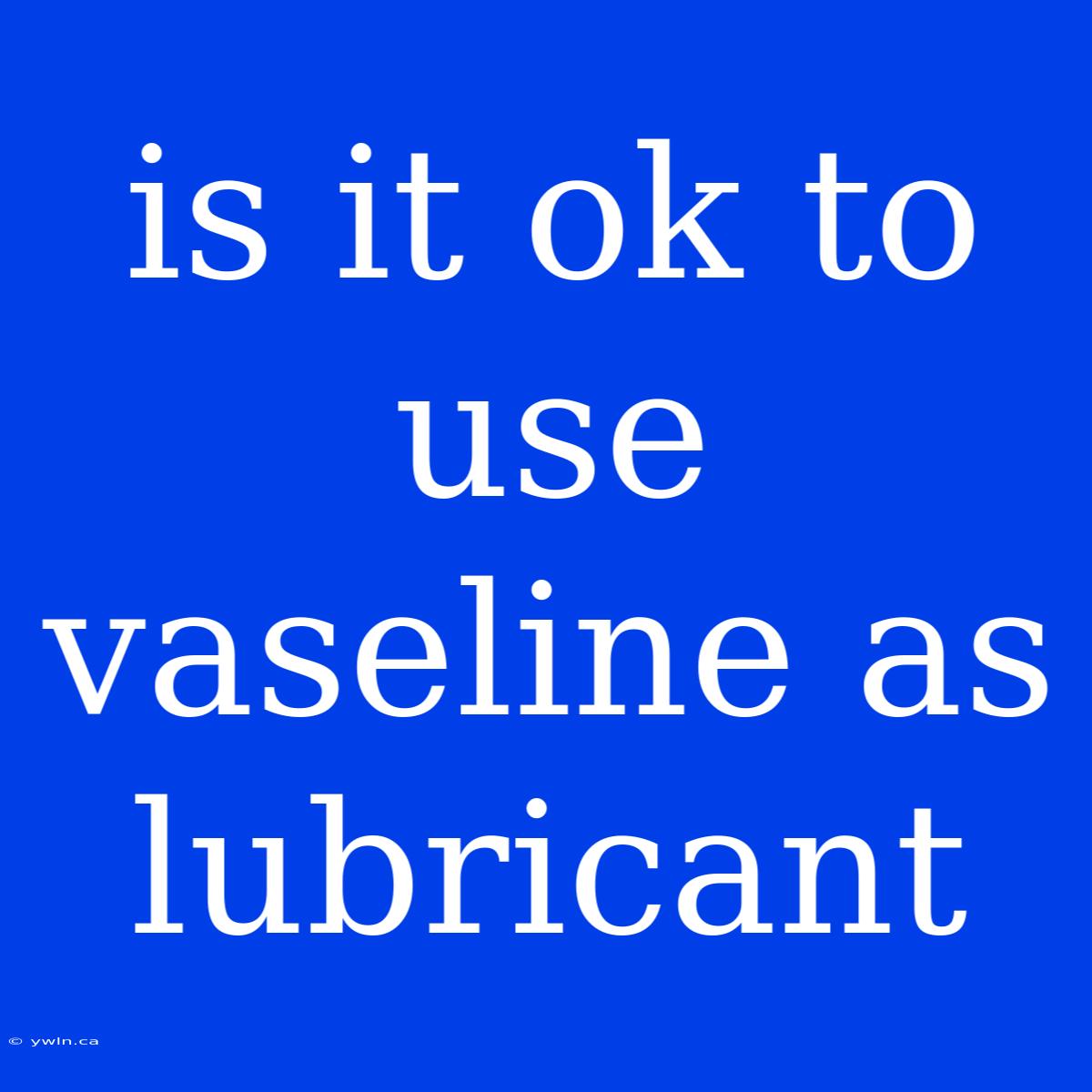Is Vaseline Okay to Use as a Lubricant? A Comprehensive Guide
Is Vaseline safe to use as a lubricant? This question has been a source of debate for years. While readily available and seemingly harmless, using petroleum jelly as a lubricant can be risky, especially for sexual activity.
Editor's Note: Vaseline's suitability as a lubricant is a crucial topic due to its potential risks and misconceptions. This guide aims to dispel myths and provide reliable information for informed decisions regarding personal care.
Analysis: We've delved into scientific literature, medical expert opinions, and user reviews to compile this comprehensive guide. We'll explore the complexities of using Vaseline as a lubricant, evaluating its benefits, drawbacks, and alternative options.
Key takeaways:
| Aspect | Description |
|---|---|
| Benefits | Vaseline acts as a barrier and can temporarily soothe dry skin. |
| Drawbacks | Petroleum jelly can trap bacteria, cause irritation, and reduce sensitivity. |
| Alternatives | Water-based or silicone-based lubricants offer safer and more effective options. |
| Usage | Vaseline is best suited for non-sexual uses like moisturizing dry skin. |
Vaseline: A Look at the Pros and Cons
Introduction: While Vaseline is commonly known for its moisturizing properties, its effectiveness and safety as a lubricant are debatable. Let's examine both sides of the coin.
Key Aspects:
- Moisture barrier: Vaseline creates a barrier that helps retain moisture, potentially useful for dry skin.
- Cost-effective: Vaseline is readily available and generally affordable.
- Potential for irritation: Vaseline can trap bacteria and moisture, potentially leading to irritation or infection, especially in sensitive areas.
- Reduced sensitivity: Vaseline's thick consistency can reduce sensitivity, affecting sexual pleasure.
- Compatibility issues: Vaseline is not compatible with latex condoms and can weaken their effectiveness.
Discussion: Vaseline's barrier properties can be beneficial for dry skin, but the same property can hinder natural lubrication and cause discomfort, especially in sensitive areas. Its tendency to trap moisture can create a breeding ground for bacteria, increasing the risk of infection. Additionally, its thick texture can reduce sensitivity, negatively impacting sexual experience. Lastly, using Vaseline with latex condoms is strongly discouraged as it can compromise the condom's integrity, increasing the risk of unintended pregnancies and sexually transmitted infections.
Alternatives to Vaseline as a Lubricant
Introduction: Several safer and more effective alternatives to Vaseline are available for various purposes.
Facets:
- Water-based lubricants: These lubricants are readily absorbed, are generally hypoallergenic, and are compatible with latex condoms.
- Silicone-based lubricants: These lubricants provide long-lasting lubrication, are hypoallergenic, and are compatible with latex condoms.
Summary: Water-based and silicone-based lubricants offer better lubrication, reduced risks, and increased compatibility with condoms compared to Vaseline.
FAQ: Vaseline as Lubricant
Introduction: This section addresses common questions and misconceptions regarding Vaseline as a lubricant.
Questions:
- Q: Can I use Vaseline for sexual activity?
- A: While it's possible, Vaseline is not recommended as a lubricant for sexual activity due to its potential for irritation, reduced sensitivity, and incompatibility with latex condoms.
- Q: Can I use Vaseline with latex condoms?
- A: No, Vaseline can degrade latex condoms, compromising their effectiveness.
- Q: Is Vaseline safe for sensitive skin?
- A: While Vaseline can temporarily moisturize, its occlusive properties can trap moisture and bacteria, potentially leading to irritation and infection in sensitive areas.
- Q: Is Vaseline better than water-based lubricant?
- A: Water-based lubricants are generally safer and more effective for sexual activity.
- Q: Can I use Vaseline as a vaginal moisturizer?
- A: Using Vaseline in the vaginal area is not recommended due to its potential to trap bacteria and disrupt the natural vaginal environment.
- Q: Is Vaseline safe for rectal use?
- A: Vaseline is not recommended for rectal use due to potential irritation and risk of infection.
Summary: Using Vaseline as a lubricant for sexual activity is not recommended due to its potential health risks and incompatibility with latex condoms.
Tips for Choosing a Lubricant
Introduction: Selecting the right lubricant is crucial for a safe and enjoyable experience.
Tips:
- Choose water-based or silicone-based lubricants: These types are generally considered safe and effective for sexual activity.
- Check compatibility with condoms: Ensure the lubricant is compatible with latex condoms if you plan to use them.
- Consider your skin type: If you have sensitive skin, choose hypoallergenic lubricants.
- Read the label carefully: Pay attention to ingredients and warnings.
- Test a small area first: Apply a small amount of lubricant to a less sensitive area to check for any irritation before using it on sensitive areas.
Summary: Selecting the right lubricant based on its intended use, compatibility, and individual skin sensitivity is essential for a safe and pleasant experience.
Summary: Vaseline as a Lubricant: A Cautionary Tale
Summary: While Vaseline might appear like a simple solution for lubrication, its use as such poses significant health risks. Its occlusive properties, potential for irritation, and incompatibility with latex condoms make it a less-than-ideal choice, particularly for sexual activity.
Closing Message: Prioritize your health and well-being when choosing lubricants. Opt for safe, effective alternatives like water-based or silicone-based lubricants. Remember, knowledge empowers you to make informed choices for your personal care and sexual health.

